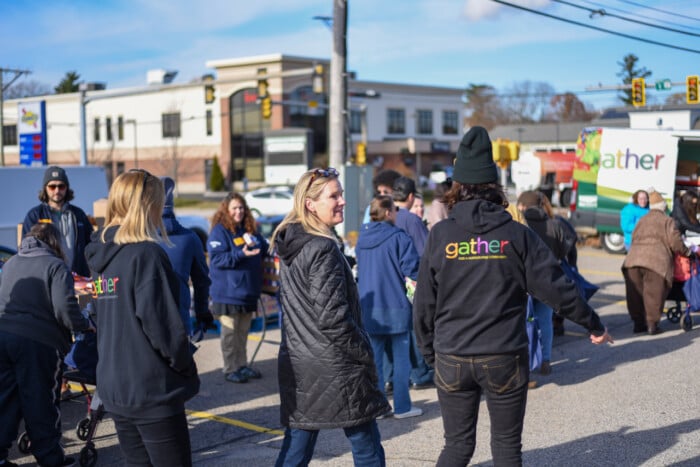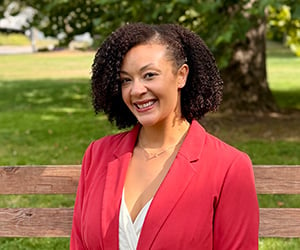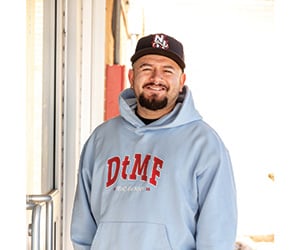Unseen Heroes
In an aging state, family caregivers offer support and advice for those starting the journey
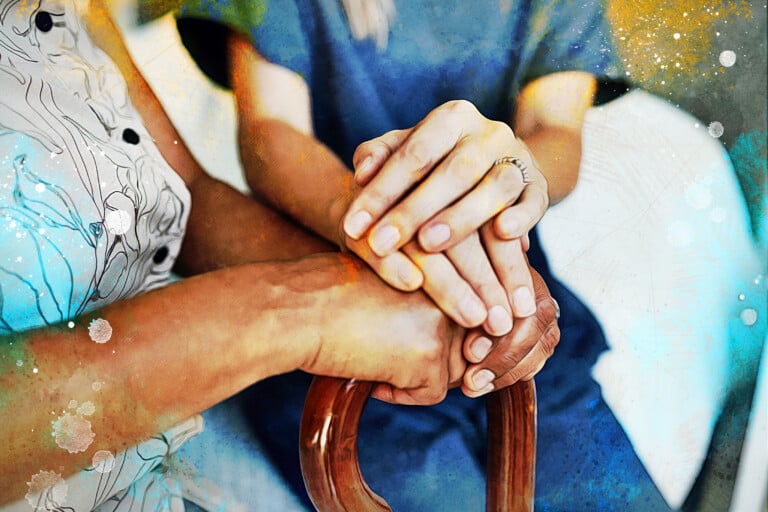
There’s a good chance someone you know — a friend, a coworker, a boss or a cousin — is a caregiver.
The numbers are surprising: The New Hampshire Department of Health and Human Services says one out of every four U.S. households has a family caregiver — someone who’s helping another family member who is aging, or has serious illness or disabilities.
The role is not going away anytime soon: New Hampshire is the second oldest state in the nation, according to the Carsey School of Public Policy.
Though common, every caregiver’s story is unique, says Christina FitzPatrick, state director of AARP New Hampshire, a nonprofit advocacy group that recently put out a call for people to share their personal stories.
“We’re trying to shine a light on the needs of family caregivers,” FitzPatrick says.
Many responded to AARP with honest advice for others navigating their own journey.
‘I can never retire’
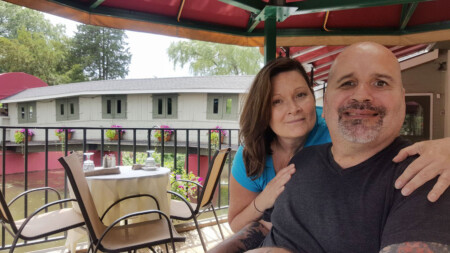
Barbara Tarallo poses with her husband, Tom, who has dementia as a result of two traumatic brain injuries.
Barbara Tarallo of Pelham has been the primary caregiver for her husband, Tom, a former construction worker, for about 14 years. Years ago, Tom suffered a traumatic brain injury. A second head injury years later led to cognitive deficits, including short-term memory and dementia.
“He can remember the telephone number at the house that I lived in with my parents, but he can’t remember where he lives right now,” Tarallo says.
She works full-time from home for a Canadian software company and helps Tom with toileting, feeding and cleaning. Her retirement funds help pay for a home health aide three days a week so she can focus on work.
“I definitely work past eight o’clock at night most nights. And I sometimes will have to work over the weekends,” says Tarallo, who is thankful her workplace is flexible and understands her needs.
Given their financial situation, Tarallo faced a tough choice. She and Tom live off her income, as Social Security benefits weren’t enough. Since her income put them above the state poverty level, Tom didn’t qualify for Medicaid. For eligibility, a lawyer told her she had two options: Either quit her job, or divorce him and petition for guardianship.
“I won’t divorce a man I have been married to for 37 years and I love with all my being,” Tarallo told ARRP. “And I cannot quit my job as I would not be able to pay the bills.”
Tom needs specialized, more expensive service, such as a memory care unit.
“I can never retire. The cost of caring for him here is a lot,” she says.
She hopes others in similar situations can plan ahead before traumatic events happen.
“It takes a lot of planning. You have doctor’s appointments and dentist appointments,” Tarallo says. “You’re coordinating his schedule, your schedule and your work schedule, and trying to make sure everything fits in the day.”
Full-time unpaid job
While Susan Sherrouse of Concord was caring for her mom, who had a rare blood disorder and skin cancer, her late husband, Al, also got sick. A Vietnam veteran, Al struggled with alcohol use disorder, PTSD and anger management.
Al’s issues increased to the point where Sherrouse had to stop working. When she sought VA compensation for Al’s illnesses, the VA didn’t recognize her as his caregiver. As a widow, she receives Social Security but has no savings.
“Caregiving is a full-time 24/7 job that we don’t get paid for,” Sherrouse says. “I was unable to work during what would have been some of my most productive years.”
Like Tarallo, Sherrouse doesn’t expect to retire. She works part-time as an administrative assistant and Realtor at Coldwell Banker Lifestyle in Concord, not only to make money, but to keep healthy social connections.
“If I had no job to go to, if I wasn’t a Realtor, I’d probably die of boredom,” she says.
Sherrouse’s caregiving journey also came with additional sadness and disappointment. She wasn’t happy with the care her mother received in hospice. And other family members couldn’t support her, financially or otherwise.
She has continuing fallout from her time as a caregiver.
“It took a real serious toll, and it’s something that I still live with. You’re giving care to the person that you love,” Sherrouse says. “Their care comes first. Your care comes second. There were doctors that I hadn’t seen in years that I couldn’t go to because I couldn’t trust that (my husband and mother would be OK).”
FitzPatrick acknowledges that caregivers carry emotional burdens like isolation, burnout and guilt. They feel caregiving is simply their duty.
“They just think of themselves as being the spouse, the daughter, the son,” FitzPatrick says.
Caregivers also navigate the health system, paying bills and do meal prep, leading to more financial burdens.
And family roles can be quickly reversed.
“If you think about all the things your husband did, all of a sudden, your husband’s not doing them anymore, and there’s no income coming in,” Tarallo says. “All of those responsibilities fall to you.”
And if there’s a chance they can eventually go back to work, they may be too old to do so.
“I don’t think there ever will be enough resources out there to help caregivers. My husband was VA-connected. At that point in time, (the VA) didn’t recognize me being his caregiver,” Tarallo says, but adds that a few years after he died, the VA recognized family caregivers and offered stipends.
Finding financial footing
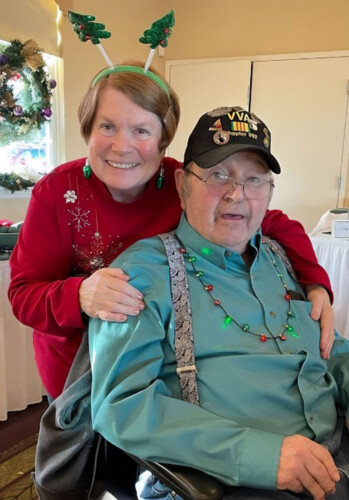
Eveleen and Ron Barcomb were married for about four years before Ron suffered a life-changing brain bleed.
Eveleen Barcomb, an independent contractor from Goffstown, had been married to Ron for about four years when he suffered a brain bleed, a type of stroke, in 2009 during a Fisher Cats game. Barcomb says their future plans dissolved soon after that.
“That’s not what we had planned. We were going to retire and get an RV and travel, so none of that ever happened. But, you know, life gives you lemons, and you just have to work with it,” Barcomb says.
She cherishes the time they spent together.
“He was a hoot, you know? He was a lot of fun. We would have fun going to yard sales and flea markets and getting in the car on the weekend and just taking a trip,” she says.
Ron, a Vietnam veteran, eventually came home, but had copious doctors’ appointments and trips to Mass General Hospital. He was later diagnosed with Parkinson’s disease, and was placed in a veterans home.
During the last year of his life, Ron was diagnosed with chronic lymphatic leukemia, likely a result of exposure to Agent Orange, an herbicide the government used during Vietnam.
Barcomb did everything she could to keep his spirits up, like getting his favorite sub from Tilton House of Pizza, ordering their Thanksgiving dinner from Hart’s Turkey Farm, or making sure he had access to his favorite show, “NCIS,” while at the nursing home.
Like many family caregivers, Barcomb took on additional roles, like being a social planner to improve Ron’s quality of life. Barcomb was mentally exhausted.
“My time was never my own completely. I was always like, ‘What are we going to do this weekend?’ ‘What’s our next trip?’ ”
She also took charge of the household expenses that Ron used to do.
But since some accounts were in her husband’s name, Barcomb couldn’t easily write checks.
“It was a second marriage for me, so we kept our checking account separate. As a result, I couldn’t get into his checking account to pay his bills, so I had to go before a judge and get legal guardianship in order to navigate the finances,” Barcomb says.
It’s not something she wants others to go through.
“I have a friend whose husband is going through a medical issue. I asked her: ‘So who takes care of your bills?’ She says, ‘He does.’ I said that you need to start learning what he’s doing … so that you’re not in a total crisis situation yourself.”
Barcomb says a social worker advised her to “remove” yourself as a spouse to objectively do what’s best for him or her.
“That was very difficult. I felt like I was letting him down, but I wasn’t,” Barcomb says.
Despite everything, Barcomb remains positive. She plans to volunteer soon at the veterans home where Ron stayed.
“I want to give back. I want to be that person that can help someone get through a bad situation — just be there for her and know that she’s not alone,” Barcomb says.
The value of caregivers
FitzPatrick wants caregivers to know that their time and efforts have actual value.
In New Hampshire, a state with 1.3 million residents, about 168,000 were family caregivers in 2021, according to a 2023 AARP Public Policy Institute report, “Valuing the Invaluable.”
The report likens caregivers’ duties to working at a traditional job: Logging about 157 “care hours” per year, caregivers in New Hampshire would theoretically make about $17.96 an hour. Those as-yet nonexistent funds could help pay for bills, food or supplies, like outfitting the home with grab bars to make it safe to get around.
“People spend, on average, $7,000 a year for family caregiving duties. Some of them have to cut back on work. So there’s a real financial burden there,” FitzPatrick says.
Just getting the word out can raise more awareness of the silent struggles working families endure, FitzPatrick says.
“It’s important for people in the community to hear those stories, to develop a better understanding and develop a sense of urgency about why it’s so important to understand the needs of family caregivers.”
FitzPatrick says supports, resources, and a community of caregivers can relate.
“There are a lot of people in their position who are feeling just as burdened and just as overwhelmed. People see this as a duty, and might have trouble asking for help,” FitzPatrick says.
Support groups include the Alzheimer’s Association, the Brain Injury Association, the Veterans Administration and visiting nurse agencies throughout the state. AARP also offers support groups to members and nonmembers.
To read more about Barbara Tarallo, Eveleen Barcomb and Susan Sherrouse’s caregiving journeys, visit states.aarp.org/new-hampshire and search under
“caregiving.”
Groups Lending a Helping Hand
Brain Health Support:
Brain Injury Association of New Hampshire
In-person and virtual support groups in
Portsmouth, Conway, Peterborough, Concord, Atkinson and Keene.
bianh.org • 603-225-8400
MA / NH chapter of the Alzheimer’s Association
alz.org/manh • 24/7 help line: 800-272-3900
Online Caregiving Supports:
AARP caregiving resource line
aarp.org/caregiving • 1-877-333-5885
For Spanish speakers • 1-888-971-2013
Family Caregiver Alliance
caregiver.org • 800-445-8106
Partnership for Public Health
pphnh.org/human-services/caregiver-network
Belknap County office • 603-528-6945
Carroll County office • 603-323-2043
NH Family Caregiver Support Program
dhhs.nh.gov/servicelink/caregiver-support-services •
1-866-634-9412
ServiceLink Aging and Disability Resource Center and related services
dhhs.nh.gov/programs-services/adult-aging-care/servicelink • 866-634-9412
ServiceLink Aging & Disability Resource Center
dhhs.nh.gov/programs-services/adult-aging-care/servicelink • 866-634-9412
Self-Help Support / Resources:
Financial literacy: Catholic Charities NH; locations throughout New Hampshire
cc-nh.org/services/community-services-assistance •
603-669-3030
Caregiver Corner – Links to online training
dhhs.nh.gov/programs-services/adult-aging-care/servicelink/caregiver-corner
Transportation assistance:
Caregivers, a program of Catholic Charities NH, provides rides to older adults and others with disabilities. Rides are provided for grocery shopping, dialysis and doctor appointments, etc.
Sign up: caregiversnh.org/services/caring-rides •
603-622-4948


